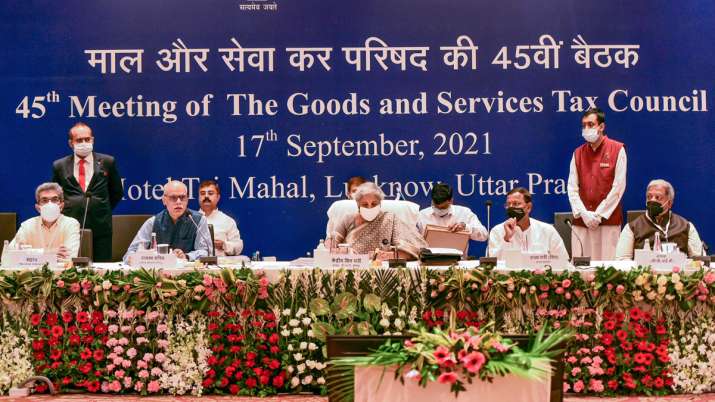
FM Nirmala Sitharaman chaired the 45th meeting of the GST Council in Lucknow on Friday (September 17).
The crucial meeting of the GST Council to increase tax exemption on 11 COVID-19 drugs and review tax rates of over 4 dozen items like oncology medicine and coconut oil began here on Friday. The 45th meeting of the GST Council, chaired by Finance Minister Nirmala Sitharaman and chaired by the Finance Ministers of the states, is the first physical meeting since the onset of the COVID-19 pandemic.
The last such meeting was held 20 months back on December 18, 2019. Since then the council meeting is being held through video-conferencing. There is no provision for video conferencing in Friday’s meeting and finance ministers of almost all the states except Gujarat are attending the meeting.
The council will also discuss the modalities of compensation payable to the states from July 1, 2022. Also, taxing petrol and diesel under a single national GST tax. It will consider a proposal to extend the existing concessional tax rate structure on anti-coagulants such as amphotericin B, tocilizumab, remdesivir and heparin from the current September 30 to December 31, 2021. The tax rate on amphotericin B, tocilizumab, was cut to ‘zero’, while remdesivir and heparin were reduced to 5 per cent in June 2021.
The council will also discuss on Friday a proposal to reduce GST from 12 per cent to 5 per cent by December 31, 2021. These are itolizumab, posaconazole, infliximab, bamlanivimab and atacevimab, casirivimab and imdevimab, 2-deoxy-D-glucose and favipiravir.
To prevent tax evasion, a proposal to make food delivery platforms like Swiggy and Zomato liable to pay Goods and Services Tax on restaurant services supplied through them will also be considered by the council. Once approved by the GST Council, the food delivery app will have to deposit the GST with the government at the location of the restaurant for the deliveries made by them. There will be no additional tax burden on the end consumer. As per estimates, the tax loss to the exchequer is Rs 2,000 in the last two years due to alleged under-reporting by food delivery aggregators.
In light of the order of the Kerala High Court, the council will also discuss taxing petrol and diesel under GST, a move that may require both the central and state governments to compromise heavily on the revenue from taxing these products. Is. In June, the Kerala High Court, based on a writ petition, had asked the GST Council to take a decision on bringing petrol and diesel under the ambit of GST.
Along with this, the interim report of the State-Ministerial Panel on Capacity Based Taxation on Pan Masala and Composition Scheme for Brick Kilns and Stone Crusher will also be discussed. The panel, which has sought an extension of its tenure by three months to examine the remaining issues, has recommended a special composition scheme in the brick kiln sector with effect from April 1, 2022, with a GST rate of 6 per cent without ITC. Has been done. Input tax credit), similar to the rate in the service sector. It has also suggested increasing the GST rate on supply of bricks from 5 per cent to 12 per cent (with ITC) from April 1.
The council will review and clarify the GST rates for 32 goods and 29 services. Items under review include Zolgensma and Viltepso drugs for personal use, solar PV modules, copper concentrate, carbonated beverages with fruit juice, coconut oil, flavored sweet betel nut, oncology medicine and diesel-electric engines.
.